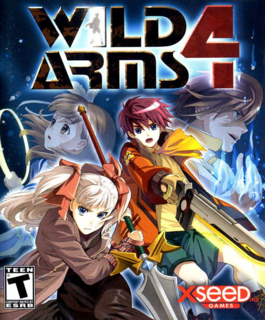Moving away is both its curse and blessing.
Wild Arms, if indicated by the third game in its series, has grown stale, survived only by its niche group of fervid fans. Its persistence to keeping things strictly within Role Playing 101 makes it unable to keep up with the current generation of gamers, whose needs are readily served by the adrenaline action/graphical behemoths rivals such as Final Fantasy furiously introduces. It needed a cup of reinvigoration, and in Wild Arms 4 it saw what it needed. The cup, however, was left half-filled.
Players follow the footsteps of Jude Maverick, a young boy whose definition of the world is the Ciel Village that envelops his 13 years of existence. A chain of unexpected events occurred, and Jude suddenly realised he possesses the power to control ARMs, a forsaken weapon sealed for its destructive power. The main tale of Wild Arms 4 did nothing to seek for the change the series desperately needed. Largely derivative of other Japanese Role Playing game, it carries with it an air of "seen it before" from start to finish. Whether it is the cast of stereotypical characters, their insipid dialogues, or the ill-conceived graphics, there is hardly anything to make this game any more memorable outside of the short 30 hours of game play.
Introducing cross-genre elements is never a bad first step to revitalising this stoic series. Exchanging dexterity for brains, Wild Arms 4 shifts its focus on Platforming instead of the Puzzle Solving elements featured heavily in prior games. In exploring the many excellent dungeon designs found in Filgaia, Jude will need to jump over barriers, slide under trenches, and occasionally rely on the 'Accelerator', a tool which temporally slows down time for these stunts to be performed. The occasional let down caused by the system's overly demanding precision do not soil the overall Platforming experience, but it may be a source of frustration for some.
The unique Hex system is perhaps the greatest reason to experience Wild Arms 4. All battles take place on a board with 7 grids, where characters and enemies are randomly positioned. Commands are issued upon grids, and all characters/enemies in the targeted grid will be affected by that decision. This provides a tactical twists to battles, as players would need to move the characters around to best make use of the territorial advantages. Certain grids are also imbued with elemental effects e.g. wind and fire, offering more room for strategic planning.
The result, however, is a mixed bag. Because characters/enemies positions are randomised, battles may range from incredibly easy (all enemies in the same grid makes for easy defeating) to impossibly difficult (characters surrounded right at the start may never recover from that disadvantage). The game reconciles this by allowing each battle to be replayed infinitely upon defeat, but that in itself eliminates any form of difficulty or urgency. Random encounters can be switched off in certain areas after an optional boss is defeated, which is another neat feature introduced by Wild Arms 4.
Wild Arms 4 feels like a lightweight role playing game that is unpolished in certain parts and is thus best played as such. While many of the new features pave the way to the right direction, it just didn't go far enough to break the shackles of being "yet another JRPG". Despite its merits, it is therefore difficult to recommend the game- it didn't do enough to charm the crowd outside of the series fans, and having made so many changes to the recipe, it might have distant itself from those people who would have otherwise considered it.

